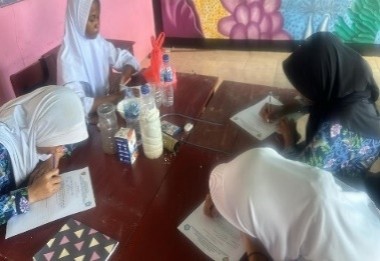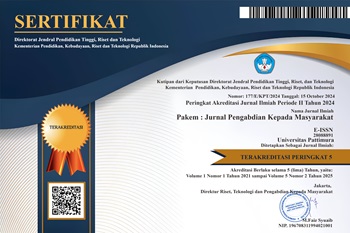PELATIHAN PENYUSUNAN ASESMEN ALTERNATIF DALAM KURIKULUM MERDEKA BAGI GURU SMA/SMK/MA DI KECAMATAN LEIHITU MALUKU TENGAH
Abstract
Assessment plays an essential role in decision-making related to student success, especially in the Independent Curriculum, which encourages a holistic assessment approach. This Community Service Program (PKM) aims to improve the skills of SMA/SMK/MA teachers in Leihitu District in compiling alternative assessments that are able to evaluate various aspects of student competency. This PKM was carried out for two days with training and mentoring methods. The activities were divided into two parts, namely two-day training and the second part was mentoring in compiling assessments. The results of this training showed an increase in teachers' ability to compile alternative assessments from the sufficient category to the good category. This finding confirms that the PKM activity has succeeded in improving teachers' ability to compile alternative assessments in the implementation of the Independent Curriculum. These results show the importance of ongoing training for teachers to support the implementation of more effective assessments in accordance with the Independent Curriculum, which ultimately strengthens the quality of decisions related to student learning development.
Downloads
References
Ahmad, K., & Parawansa, D. A. (2019). Pengaruh Role Ambiguity, Role Conflict Dan Role Overload Terhadap Kinerja Pegawai Dimediasi Perilaku Cyberloafing Pada Biro Akademik Dan Umum Universitas Sulawesi Barat. Hasanuddin Journal of Business Strategy (HJBS), 1(1).
Awinyam, J. I., Bornaa, C. S., Churcher, K. A., Owuba, L. A., Atepor, S., Adams, F. X., ... & Kwakye, D. O. (2022). Elementary School Teachers’ Opinions on Mathematics Assessment: Ghanaian Perspective. Creative Education, 13(10), 3111-3127.
Chuang, S. (2021). The applications of constructivist learning theory and social learning theory on adult continuous development. Performance Improvement, 60(3), 6-14.
Darmawan, M. S., Daeni, F., & Listiaji, P. (2020). The use of quizizz as an online assessment application for science learning in the pandemic era. Unnes Science Education Journal, 9(3), 144-150.
Dehghanzadeh, H., Farrokhnia, M., Dehghanzadeh, H., Taghipour, K., & Noroozi, O. (2024). Using gamification to support learning in K‐12 education: A systematic literature review. British Journal of Educational Technology, 55(1), 34-70.
Ghaffar, F. A., Yusop, F. D., Enhancement, A., & Enhancement, A. (2018). Redesigning Assessment for Holistic Learning: A quick guide for higher education First Edition. Kuala Lumpur: University of Malaya Press.
Ahmad, A., Parawansa, Dian AS, & Jusni. (2019). Pengaruh Role Ambiguity, Role Conflict, dan Role Overload terhadap Kinerja Pegawai Dimediasi Perilaku Cyber-loafing. Asanuddin Journal of Business Strategy, 1(1).
Awinyam, J. I., Bornaa, C. S., Churcher, K. A., Owuba, L. A., Atepor, S., Adams, F. X., Bawa, G. M., Assan-Donkor, I., Erzuah, E., & Kwakye, D. O. (2022). Elementary School Teachers’ Opinions on Mathematics Assessment: Ghanaian Perspective. Creative Education, 13(10), 3111–3127.
Chuang, S. (2021). The applications of constructivist learning theory and social learning theory on adult continuous development. Performance Improvement, 60(3), 6–14.
Darmawan, M. S., Daeni, F., & Listiaji, P. (2020). The use of quizizz as an online assessment application for science learning in the pandemic era. Unnes Science Education Journal, 9(3), 144–150.
Dehghanzadeh, H., Farrokhnia, M., Dehghanzadeh, H., Taghipour, K., & Noroozi, O. (2024). Using gamification to support learning in K‐12 education: A systematic literature review. British Journal of Educational Technology, 55(1), 34–70.
Ghaffar, F. A., Yusop, F. D., Enhancement, A., & Enhancement, A. (2018). Redesigning Assessment for Holistic Learning: A quick guide for higher education First Edition. Kuala Lumpur: University of Malaya Press.
Irwansyah, R., & Izzati, M. (2021). Implementing Quizizz as game based learning and assessment in the English classroom. TEFLA Journal (Teaching English as Foreign Language and Applied Linguistics Journal), 3(1), 13–18.
Junior, J. B. B. (2020). Assessment for learning with mobile apps: exploring the potential of quizizz in the educational context. International Journal of Development Research, 10(01), 33366–33371.
Kementerian Pendidikan dan Kebudayaan. (2020). Panduan Implementasi Kurikulum Merdeka Belajar.
Mahendra, I. W. E. (2019). Asesmen Alternative Dalam Pembelajaran Matematika. Prosiding Senama PGRI, 1, 12–19.
McMillan, J. H. (2013). Research on classroom assessment. Thousand Oaks, CA: Sage Publications, Inc.
Nurwiatin, N. (2022). Pengaruh pengembangan kurikulum merdeka belajar dan kesiapan kepala sekolah terhadap penyesuaian pembelajaran di sekolah. Edusaintek: Jurnal Pendidikan, Sains Dan Teknologi, 9(2), 472–487.
Pantiwati, Y. (2016). Strategi Pembelajaran, Self Assessment, Dan Metakognisi Dalam Pembelajaran Sains. Research Report.
Renta-Davids, A.-I., Jiménez-González, J.-M., Fandos-Garrido, M., & González-Soto, Á.-P. (2014). Transfer of learning: Motivation, training design and learning-conducive work effects. European Journal of Training and Development, 38(8), 728–744.
Sudrajat, D. (2019). Asesmen pembelajaran bahasa inggris: Model dan pengukurannnya. Intelegensia: Jurnal Pendidikan Dan Pembelajaran, 4(1), 1–20.
Wikarya, Y., Maidarman, M., & Eswendi, E. (2018). Pengembangan Dan Penerapan Asesmen Alternatif Bagi Guru Sekolah Dasar. Gorga: Jurnal Seni Rupa, 7(2), 225–232

Copyright (c) 2025 PAKEM : Jurnal Pengabdian Kepada Masyarakat

This work is licensed under a Creative Commons Attribution-NonCommercial-ShareAlike 4.0 International License.
Authors who publish with PAKEM: Jurnal Pengabdian Kepada Masyarakat agree to the following terms:
- Authors grant copyright to the journal and right of first publication with the work simultaneously licensed under a Creative Commons Attribution License (CC BY-NC-SA 4.0)
- Authors are able to enter into separate, additional contractual arrangements for the non-exclusive distribution of the journal's published version of the work (e.g., post it to an institutional repository or publish it in a book), with an acknowledgment of its initial publication in this journal.
- Authors are permitted and encouraged to post their work online (e.g., in institutional repositories or on their website) prior to and during the submission process, as it can lead to productive exchanges, as well as earlier and greater citation of published work.

1.png)













